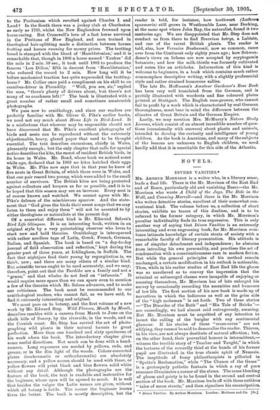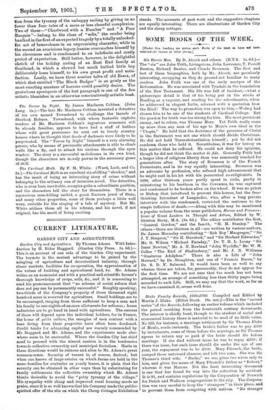MR. ARTHUR MORRISON is a writer who, in a literary
sense, leads a dual life. There is the Mr. Morrison of the East End and of Essex, particularly old and vanishing Essex—the Mr. Morrison who wrote A Child of the Jago, The- Hole in the Wall, and Cunning Murrell—and there is the Mr. Morrison who writes detective stories, excellent of their somewhat con- ventional kind. The volume before us, a collection of short stories, exhibits no traces of this dualism; and is to be referred to the former category, in which Mr. Morrison's peculiar individuality finds its true expression. This is only another way of saying that Divers Vanities is an extremely interesting and even engrossing book, for Mr. Morrison com- bines intimate knowledge of certain strata of society with a remarkable faculty of literary presentation. His attitude is one of singular detachment and independence ; be abstains from intruding his own personality, and practises the art of condensation with a conscientiousness rare in modern fiction. But while the general principles of his method remain unchanged, a certain modification in his outlook is noticeable. Thus, while in his earlier studies of East End life the gloom was so unrelieved as to convey the impression that the criminal or submerged classes were incapable of enjoying or amusing themselves, Mr. Morrison has of late enlarged his survey by occasionally recording the amenities and humours of low life. The first section of his new book is made up of narratives in which the ludicrous as well as the grim side of the "high mobsman " is set forth. Two of these stories —" The Disorder of the Bath " and " His Tale of Bricks"— are exceedingly, we had almost said outrageously, amusing. But Mr. Morrison must be acquitted of any intention to invest the calling of the burglar with any sentimental glamour. If his stories of these " cross-coves " are not edifying, they cannot be said to demoralise the reader. Thieves, in his view, are not always destitute of natural affection ; but, on the other hand, their proverbial honour is intermittent,— witness the terrible story of " Teacher and Taught," in which the tortures of the cowardly thief at the hands of his former pupil are illustrated in the true classic spirit of Nemesis. The ineptitude of fussy philanthropists is pilloried in " Spotto's Reclamation," while " The Chance of the Game" is a grotesquely pathetic fantasia in which a ray of pure romance illuminates a corner of the slums. The same blending of gloom and gaiety is to be found in the second and central section of the book. Mr. Morrison leads off with three ruthless " tales of mean streets," and then signalises his emancipation.
* Divers Vanities By Arthur Morrison. Loudon : Methuen and Co. [68.] Lion from the tyranny of the unhappy ending by giving us no fewer than four tales of a more or less cheerful complexion. Two of these—" Cbarlwood with a Number" and " A Poor Bargain "—belong to the class of " sells," the reader being baulked in the first of an expected tragedy by a totally unlooked- for act of benevolence in an unpromising character, while in the second an avaricious legacy-hunter overreaches himself by his cleverness and is condemned to an indefinite and costly period of expectation. Still better, however, is the delightful sketch of the holiday outing of an East End family at Southend, in which a shrewd but much bullied little boy deliberately loses himself, to his own great profit and satis- faction. Lastly, we have three sombre tales of old Essex, of which that entitled "The Black Badger" is as grisly as the most exacting amateur of horrors could possibly desire. The gratuitous aposiopesis of the last paragraph is one of the few artistic blemishes in an otherwise conscientiously artistic book.
The Terror by Night. By James Maclaren Cobban. (John Long. 6s.)—The late Mr. Maclaren Cobban invented a detective of his own named Townshend to challenge the laurels of Sherlock Holmes. Townshend, with whose fantastic exploits readers of Mr. Maclaren Cobban's ingenious romances will be already familiar, appears to have had a staff of butlers whom with great prescience he sent out to lonely country houses where he thought that deeds of darkness were likely to be perpetrated. The " Terror by Night" himself is a very alarming person, who by means of pneumatic attachments is able to climb walls like a fly, and to attack his victims through the open window. The story is a successful melodrama in its own kind, though the characters are merely pawns in the necessary game of skill.
The Cardinal Moth. By F. M. White. (Ward, Lock, and Co. Os.)—The Cardinal Moth is an excellent six-shilling "shocker," and has the merit of being an interesting story of crime without belonging to the ordinary run of detective novel. The detective, who is even here inevitable, occupies quite a subordinate position, and the characters tell the story for themselves. There is a mysterious man-killing orchid, a great Eastern jewel of State, and many other properties, some of them perhaps a little well worn, suitable for the staging of a tale of mystery. But Mr. White utilises them all in his scheme, and his novel, if not original, has the merit of being exciting.
CURRENT LITERATURE.











































 Previous page
Previous page